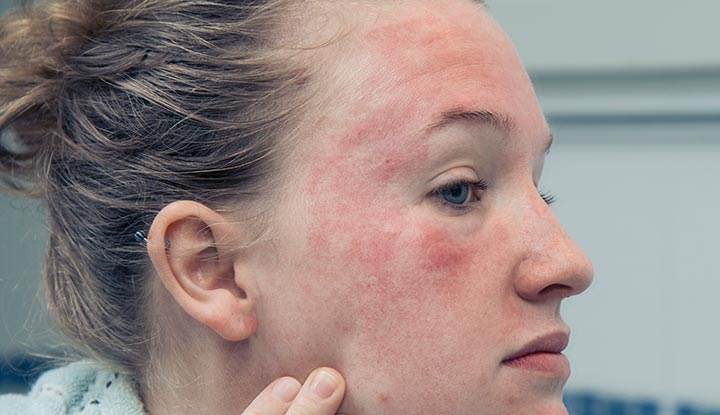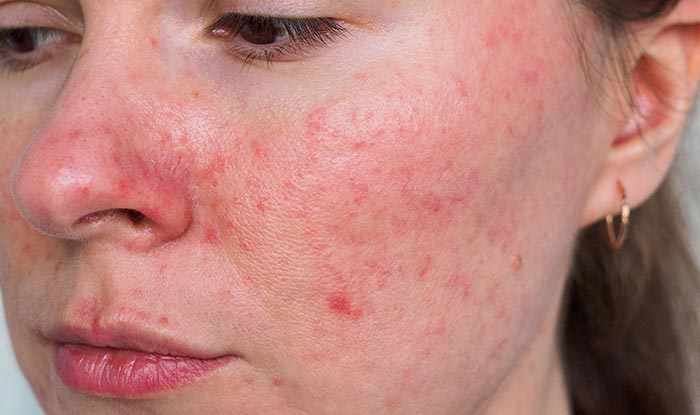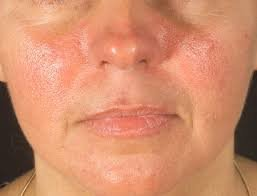Understanding Sensitive Skin
Before exploring skincare regimens, it is essential to grasp the true nature of sensitive skin. Chemicals, colors, and scents included in goods that come into touch with the skin might cause localized reactions in people with sensitive skin. Additionally, sensitive skin could be a sign of an underlying illness.
Many people claim they have sensitive skin because skin care products or household products that come into contact with their skin cause stinging, burning, itching, redness, or tightness. However, there are ways to avoid potential triggers and soothe irritated skin, which may help people with sensitive skin find relief and improve their quality of life.
People claim to have it because whenever they come into contact with a product, their skin always feels uncomfortable, even if there are no noticeable side effects. Sensitive skin is defined by an increased sensitivity to environmental elements, skincare items, and even specific fabrics.
What Causes Sensitive Skin
Sensitive skin conditions were overlooked for a long time. It’s common for people to believe they don’t require medical care. However, those with sensitive skin are negatively impacted in their lifetime, even though it is only a “minor problem.” Since both indoor and outdoor air can cause skin reactions, sensitive skin plays a significant part in their lifestyle choices, influencing what they buy, eat, wear, and even where they go. It can be quite stressful for them to have to deal with the fallout every day. There are many different types of triggers for sensitive skin.
1. Dry skin: Sensitive skin can coexist with dry skin in some people. As the skin loses the lipids and moisture that keep it from drying out, it tends to become more sensitive. The hands, face, and arms are parts of the body that are exposed to the weather and may be more prone to developing dry skin. Preventing skin from drying out might be achieved by maintaining its moisture content. Using face creams and hydrating lotions daily may help avoid symptoms.
2. Eczema: Atopic dermatitis, often known as eczema, is a skin disease that typically results in dry, itchy areas of skin, however, individual symptoms may differ. Although the disease usually affects children, eczema can also affect adults. Eczema flare-ups most frequently occur on the face, elbows, neck, wrists, ankles, and legs. These are typically rough, irritating places where people get rashes. This might be more difficult to see on darker skin.

3. Rosacea: People who have rosacea often have red skin and visible blood vessels on their faces. A rash of tiny, pus-filled pimples may appear on the skin in certain individuals. There are various varieties of rosacea and a range of symptoms they might cause. This may manifest as flushing, redness, swollen, itchy eyes, and rashes that resemble acne.

4. Photodermatoses: A skin condition known as photodermatoses is an abnormal response to sunlight. Sunlight can activate the sensitive immune system of individuals with this illness, leading to a cutaneous reaction to the UV radiation. In individuals with photodermatoses, exposure to sunlight may result in the development of a rash, blisters, or scaly areas on exposed skin. The longer the skin is exposed to sunlight, the greater the reaction develops.

Building a Gentle Skincare Routine
People will react differently to different ingredients, so it might be useful to look for products that are made especially for sensitive skin, which means they won’t contain common irritants like sulfates, dyes, preservatives, emulsifiers, alcohols, certain botanical oils like lavender, and fragrances. Nevertheless, given the wide variety of skin problems and sensitivities that exist, you can’t always rely on a label that says “sensitive skin.” Therefore, when in doubt, get advice from a dermatologist on what ingredients to avoid, or do a patch test on a tiny area of your skin before using the product all over (more on that in a minute). It is crucial to have a mild skincare regimen in place to preserve the well-being and equilibrium of delicate skin. Below is a detailed manual on creating a regimen that cares for and shields your skin.
- Cleansing: Select a gentle cleanser that is appropriate for your skin type, as regular soaps can be abrasive and unpleasant. Seek for one that doesn’t interfere with your skin’s natural protective layer or alter its pH balance. If you have oily skin, seek for a cleanser that is specifically made to control sebum and oil production while preventing pore clogging (non-comedogenic). Just wash your face twice a day, in the morning and the evening, and be sure to pat dry your skin afterward. To avoid irritating your skin, refrain from massaging your face with the towel.
- Exfoliation: Exfoliate your skin once a week to buff away dirt, oil, and makeup, as these can exacerbate sensitive skin and cause breakouts, blackheads, and irritation. Vitamin E and pro-vitamin B5, which smooth and soften sensitive skin, are two of the skin-loving ingredients included in the finest face washes for sensitive skin. To ensure that your skin doesn’t react to the scrub, always remember to try a small area of your skin first. Next, use tiny circular motions to gently massage the scrub into your skin. Finally, rinse with warm water and pat dry.
- Moisturizing: Use moisturizer when your skin is still damp if you have dry skin. This keeps your skin smooth and supple by retaining moisture. You could believe that oily skin doesn’t require moisturizing, but even if you think you have too much oil on your skin, you still need to moisturize since even skin that is greasy can still be dehydrated. Just make sure the moisturizer you choose is oil-free and non-comedogenic so that pores won’t get clogged. Making sure you don’t forget about sun protection is easy when you use a daily moisturizer with SPF. The lowest recommended SPF value for sufficient everyday protection is 15.
- Sunscreen: Sunscreen is useful in all seasons. Regular use of sunscreen can help protect against UV-induced free radicals, which can age and damage skin. For daily protection, SPF 15 is the bare minimum; however, sunscreens with an SPF of 30 or more provide significantly greater protection. Make sure the product you select offers broad-spectrum UV protection to shield you from UVB rays, which can cause sunburn, as well as UVA rays, which can cause aging. Remember that prolonged sun exposure necessitates the use of a second layer of sunscreen, even though water resistance helps ensure that your sunscreen doesn’t wash (or sweat) off.
- Patch testing: Patch testing is essential before incorporating any new skincare products into your regular routine. Put a tiny amount of the product on a discrete part of your body, such as your inner forearm, and wait 24 to 48 hours to see if there are any negative effects. It is essential to stop using immediately if discomfort or redness develops.
- Consulting a Dermatologist: It may be wise to consult a dermatologist if you are experiencing persistent symptoms or are finding it difficult to manage your sensitive skin, even with a light skincare routine. A dermatologist can assess the state of your skin, identify any underlying problems, and recommend individualized treatment regimens that meet your unique needs. Visiting a dermatologist can be the last appointment you make each year because of your hectic schedule. Make sure to inquire about anything that comes to mind. Your dermatologist wants to support you while you work toward a diagnosis, the best course of treatment, or management of your illness. If you’ve never seen a dermatologist before, you might be reluctant to go because it can feel like a major decision.
At Theme Dermatology Clinic, we go above and beyond to ensure that every one of our patients, whether it’s their first or their forty-fifth, feels comfortable and at ease.
Why Choose Gangnam Theme Dermatology
The buzz about beauty shouldn’t cause you to get anxious. Effective skincare still starts with these principles. People who have sensitive skin should use products containing potent active ingredients with caution and patience. While you should look into things that interest you, it’s preferable to discuss them with a dermatologist about your particular needs. Moreover, you may always incorporate anything new once your existing routine feels natural to you. You now know every detail about taking care of your skin from this post by learning how to reduce irritability and maintain healthy skin with a sensitive skin care regimen.
With three board-certified dermatologists with extensive expertise, Gangnam Theme Dermatology is one of the oldest dermatology practices in Gangnam, Seoul, South Korea. It can be found right between Sinnonhyeon and Gangnam Stations, in the center of the famous Gangnam neighborhood. Over more than 20 years, the clinic cared for patients with various skin issues and types. They can assist you with acne, pigmentation, anti-aging (lifting), scars, and other skin issues. Also, among Korean clients, they are one of the most well-known skin clinics. The variety of services they offer and their knowledge of skin issues will satisfy you.
Gangnam Theme Dermatology Booking Information
The clinic can be found at 423 Gangnam-daero, Seocho-gu, Hanseung Building, 7th Floor, Seoul, South Korea. To reach out directly, dial +821094839974 on WhatsApp and Kakao. Sending a message to Gangnam Theme Dermatology will allow you to talk about your concerns, make an appointment, or receive an online consultation. Send an email to [email protected]. You can also look through everything and ask questions on the Gangnam Theme Dermatology website by clicking this link: About Us


FAQs
An increased sensitivity to environmental stimulants and skincare products is indicative of sensitive skin. Itching, redness, dryness, and a burning sensation are some symptoms of this illness. You may have sensitive skin if you frequently find yourself reacting to skincare products or outside stimuli.
One way to manage sensitivity and reduce flare-ups is to recognize and avoid common triggers, which include harsh chemicals, scents, alcohol, sulfates, extreme weather, and stress.
Start with a mild cleanser without any harsh ingredients when creating a delicate skincare routine for sensitive skin. Apply a relaxing moisturizer, a broad-spectrum sunscreen, and a light exfoliator sparingly before continuing. Patch testing should be done before adding new products to your routine.
Conclusion
The best part about this tip is that it can be used to boost the effectiveness of any product at any stage in your routine. Just grab your go-to cleanser, scrub, serum, or face cream, and get to work! All you need is a few minutes, clean, warm hands, and enough product for your fingertips to easily glide over the skin. Don’t forget to consult a dermatologist if something irritating happens. Usually, sensitive skin is not an indication of a serious skin problem. In short, certain individuals are more susceptible to skin contact products than others. Using skin care products free of harsh chemicals, perfumes, or other irritating ingredients can often help avoid symptoms or at least minimize them. Easy DIY solutions could lower sensitivity to certain products or lessen skin irritations. Anyone with persistent or worsening symptoms needs to see a doctor or dermatologist for testing. A medical condition or allergy may be the cause of the reaction. Dermatologists may also recommend alternative remedies.

